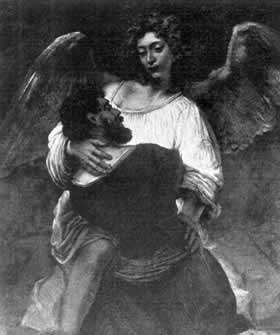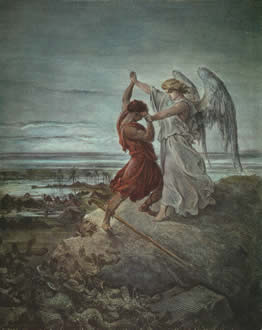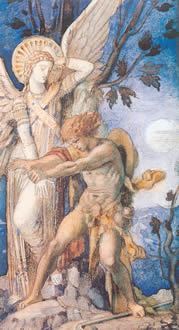"God Blessed Jacob There"
Our Human Struggle with the Divine
For Sunday July 31, 2011
Lectionary Readings (Revised Common Lectionary, Year A)
Genesis 32:22–31 or Isaiah 55:1–5
Psalm 17:1–7, 15 or Psalm 145:8–9, 14–21
Romans 9:1–5
Matthew 14:13–21
Terrence Malick has made only five films in forty years, so a new work by the reclusive Rhodes scholar who taught philosophy at MIT is an event in and of itself. The Tree of Life (2011), Malick's first film since 2005, won the Palme d'Or for best picture at the Cannes festival. I recently watched it a second time, and consider it one of the best films I've ever seen.
 |
Jacob wrestles with the angel by Rembrandt. |
The Tree of Life depicts our human struggle to squeeze some meaning out of life in a cosmos that is both beautiful and terrifying. A recurring flame in the movie symbolizes what A.O. Scott of the New York Times calls an "elusive deity" who is "both the film’s overt subject and the source of its deepest, most anxious mysteries." To explore such universal metaphysical questions, Malick focuses on one particular family in Waco, Texas (where Malick was born) during the 1950s. The film thus "shines the light of the sacred on secular reality" (Scott).
The O'Briens (Brad Pitt and Jessica Chastain) are a young couple with three boys who experience the gift of life with all its joys and sorrows. The father is deeply devoted to his family, but understandably scary to his children. He's known vocational disappointment, financial reversal, deep regrets, and feelings of failure. The mother observes that we all have a choice to live "by nature or by grace." To live by grace means we'll never be disappointed, no matter how great our loss. To live by nature means we'll never know happiness, no matter how great our gain.
The Tree of Life begins with a quotation from Job 38:4. Our human struggle elicits a divine question: "Where were you when I laid the foundations of the earth? Tell me, if you understand." Malick tracks the memories of the oldest son Jack (Sean Penn), who recalls his youthful innocence, adolescent awakening to good and evil, the death of his brother, and his uneasy place in the world as an adult. The film ends with a voice-over prayer: "Help us. Guide us 'til the end of time," which prayer is followed by a response: "Follow me." This prayer then segues to a celestial beach scene symbolizing an afterlife where cosmic reconciliation prevails.
 |
Jacob wrestles with the angel by Gustav Dore. |
The Old Testament reading this week is a story of one of the most famous human struggles with the divine—Jacob's encounter with God at the river Jabbok. The outcome of his struggle is not what we might expect.
Deep-seated family hostilities characterized Jacob's life. Because Isaac and Rebekkah played favorites, he and his fraternal twin Esau hated each other. Jacob swindled Esau of his family birthright, which entitled him to a double share of the family inheritance. Later, he lied to swindle the family blessing from his blind and dying father. When Esau threatened to kill him, Jacob fled to his uncle Laban in Haran, the very place his grandfather Abraham had departed. Jacob married his cousins Rachel and Leah, and eventually fathered thirteen children with them and their two slaves, Zilpah and Bilhah.
Sick of his father-in-law's manipulations, Jacob fled Laban, only to encounter his embittered brother Esau. The consummate deal-maker, Jacob concocted a bribe and sent a caravan of gifts, along with his women and children, across the river Jabbok. Maybe that would pacify his brother's threats? Physically exhausted and deeply anxious about Esau, alone in the desert wilderness, shorn of his considerable worldly possessions, powerless to control his fate, Jacob collapsed into a deep sleep on the banks of the Jabbok River. With Laban behind him and Esau before him, he was too spent to struggle any longer.
But only then did his real struggle begin. Fleeing his family had been bad enough; wrestling with God was a different matter. That long, lonesome night an angelic stranger visited Jacob. They wrestled through the night until daybreak, at which point the stranger crippled Jacob with a blow to his hip that made him limp for the rest of his life.
By then Jacob knew what had happened: "I saw God face to face, and yet my life was spared" (Genesis 32:30). In the process, Jacob the Deceiver, for that's the meaning of "Jacob," received a new name, Israel, which means "he struggles with God." Most important and unlikely of all, at the conclusion of that riverbank struggle, we read that God "blessed him there" (Genesis 32:29).
 |
Jacob and the angel by Gustav Moreau. |
Frederick Buechner calls Jacob's divine encounter at Jabbok the "magnificent defeat of the human soul at the hands of God." Similarly, in her book Scarred By Struggle, Transformed By Hope, the Benedictine nun and writer Joan Chittister uses the Jacob story as a paradigm for a "spirituality of struggle." In Jacob's story she identifies eight elements of our human struggle — change, isolation, darkness, fear, powerlessness, vulnerability, exhaustion, and scarring. But with each human struggle there is a corresponding divine gift — conversion, independence, faith, courage, surrender, limitations, endurance, and transformation.
"Jacob does what all of us must do," writes Chittister, "if, in the end, we too are to become true. He confronts in himself the things that are wounding him, admits his limitations, accepts his situation, rejoins the world, and moves on." The end result of the nocturnal struggle for this cheater and liar was God's blessing: "God blessed Jacob there" (32:29).
When you read further in Jacob's story, these twin themes of dark struggles accompanied by divine blessing continue to be intertwined. His daughter Dinah was raped. Two of his sons, Reuben and Judah, committed incest. As if to mimic his own parents, Jacob played favorites with his son Joseph, sewing seeds of fraternal enmity for all. And yet God renewed the covenant with him. "God appeared to him again and blessed him" (35:9). Late in life he reminisced, "God almighty appeared to me at Luz in the land of Canaan, and there he blessed me" (48:3).
Our human struggle with God is never easy, and yet within that struggle we experience divine blessing. A few weeks ago a reader in Vermont sent me a poem by William Stafford called "The Way It Is." It offers wise advice for wrestling with God:
There's a thread you follow. It goes among
things that change. But it doesn't change.
People wonder about what you are pursuing.
You have to explain about the thread.
But it is hard for others to see.
While you hold it you can't get lost.
Tragedies happen; people get hurt
or die; and you suffer and get old.
Nothing you do can stop time's unfolding.
You don't ever let go of the thread.
Jacob's struggle reminds us of that thread: we may struggle with God through the night, but by daybreak he only intends to bless us.
Image credits: (1) Project Gutenberg; (2) cgfa.acropolisinc.com; and (3) cgfa.acropolisinc.com.





